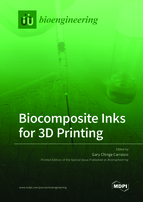Biocomposite Inks for 3D Printing
A special issue of Bioengineering (ISSN 2306-5354). This special issue belongs to the section "Biofabrication and Biomanufacturing".
Deadline for manuscript submissions: closed (30 June 2020) | Viewed by 90726
Special Issue Editor
Interests: biomaterials; hydrogels; 3D bioprinting; biocomposites; bio-applications; biomanufacturing; biofabrication
Special Issues, Collections and Topics in MDPI journals
Special Issue Information
Dear Colleagues,
Three-dimensional (3D) printing has evolved massively during the last years. The 3D printing technologies offer various advantages, including i) tailor-made design, ii) rapid prototyping, and iii) manufacturing of complex structures. Importantly, 3D printing is currently finding its potential in tissue engineering, wound dressings, tissue models for drug testing, prosthesis, and biosensors, to name a few. One important factor is the optimized composition of inks that can facilitate the deposition of cells, fabrication of vascularized tissue and the structuring of complex constructs that are similar to functional organs. Biocomposite inks can include synthetic and natural polymers such as poly (ε-caprolactone), polylactic acid, collagen, hyaluronic acid, alginate, nanocellulose, and may be complemented with cross-linkers to stabilize the constructs and with bioactive molecules to add functionality. Inks that contain living cells are referred to as bioinks and the process as 3D bioprinting. Some of the key aspects of the formulation of bioinks are e.g. the tailoring of mechanical properties, biocompatibility and the rheological behavior of the ink which may affect the cell viability, proliferation and cell differentiation.
The current Special Issue emphasizes the bio-technological engineering of novel biocomposite inks for various 3D printing technologies, also considering important aspects in the production and use of bioinks.
Dr. Gary Chinga Carrasco
Guest Editor
Manuscript Submission Information
Manuscripts should be submitted online at www.mdpi.com by registering and logging in to this website. Once you are registered, click here to go to the submission form. Manuscripts can be submitted until the deadline. All submissions that pass pre-check are peer-reviewed. Accepted papers will be published continuously in the journal (as soon as accepted) and will be listed together on the special issue website. Research articles, review articles as well as short communications are invited. For planned papers, a title and short abstract (about 100 words) can be sent to the Editorial Office for announcement on this website.
Submitted manuscripts should not have been published previously, nor be under consideration for publication elsewhere (except conference proceedings papers). All manuscripts are thoroughly refereed through a single-blind peer-review process. A guide for authors and other relevant information for submission of manuscripts is available on the Instructions for Authors page. Bioengineering is an international peer-reviewed open access monthly journal published by MDPI.
Please visit the Instructions for Authors page before submitting a manuscript. The Article Processing Charge (APC) for publication in this open access journal is 2700 CHF (Swiss Francs). Submitted papers should be well formatted and use good English. Authors may use MDPI's English editing service prior to publication or during author revisions.
Keywords
- Synthesis, production and applications of novel inks and bioinks
- Hydrogels, photopolymerizable inks, solid inks
- Surface modification and cross-linking approaches
- Cytotoxicity, genotoxicity, immunogenic properties of inks
- 3D printing technology such as fused deposition modeling, direct ink writing, digital light processing, inkjet and laser assisted bioprinting
- Applications in tissue engineering, wound dressings, cell models, artificial skin, cancer models, prosthetic devices, orthoses
- Characterisation, including structural, physical, chemical, biological and mechanical properties







